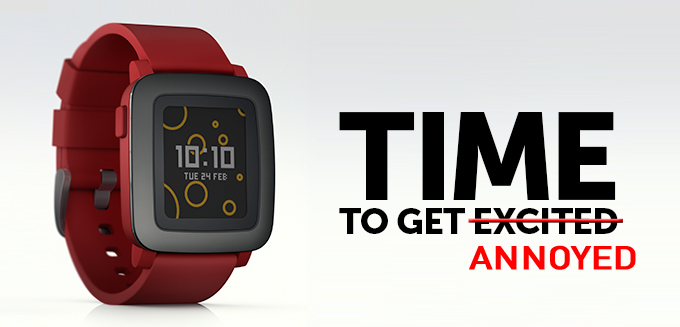Kickstarter isn't a store, so Pebble shouldn't treat it like one
It's just not fair

The maker of the Pebble smartwatch took to Kickstarter again this week, successfully pulling in enough money to fund a new version of its wearable hardware (The Pebble Time), with enough spare cash left over to pay for a fun mission to Mars for the original team members.
Problem is, it's done all this before. Pebble was one of the first wave of super successful Kickstarter fundees, with its first big win helping to launch the smartwatch boom while also going some way toward establishing the crowdfunding model as a valid way for the masses to back risky and artistic ventures.
But should previous winners be allowed to return to the trough for seconds?
There's nothing risky for Pebble in making a new version of its amazingly popular watch. The only risks it faces now are not being able to convince its factory in China to make them fast enough to meet rabid demand from tech nerds, or any negative publicity caused by people getting trampled underfoot in the stampedes to buy the updated model.
It shouldn't really be back on Kickstarter, ironic knitted hipster cap in hand, pretending it has no idea if its latest iteration will be a success or not, begging, please, for money to fabricate products, money that it promises it won't just immediately spend on alcohol for the launch party.
Kickstarter itself said, back in 2012, that the site shouldn't be used as a shop window, but that's surely exactly what Pebble's doing with its latest seven-figure global currency raid.
"Here, we've done a new version, you can order it if you want one" is what it's saying, turning the Kickstarter portal into one massive pre-ordering service for a hugely successful existing company.
Sign up for breaking news, reviews, opinion, top tech deals, and more.
Pebble is being given a free safety net by its chums at Kickstarter, which is letting it guarantee a number of sales, have the money in advance, then swan off without worrying about the dangers of capitalism and the whims of consumers that affect other tech manufacturers. Pebble wins, Kickstarter bags an almighty commission, and we get a new thing to play with.
This doesn't seem particularly fair on the the likes of Sony, LG, Samsung and the others, that, although enormous and minted, can't use a global pre-ordering basket to accurately gauge demand for their next-gen products.
It entirely removes the risk. It's not, like any other company out in the real world, taking a gamble on making 200,000 of a thing, only to discover that only 4,800 people want them, like Microsoft did with those crappy tablets, or like Microsoft did with those crappy Kin phones, or like Microsoft did with those crappy MP3 players.
Please empower us to be as rich as Mark Zuckerberg
Pebble explains the need for its latest cash-grab as if it's doing it for the benefit of the world, saying: "We're back on Kickstarter to give you - the community who cares the most - an opportunity to support our vision for wearables and get exclusive access to our newest product."
Which makes it sound like a charity, bringing the gift of being able to tell the time and dismiss some useless notifications about the weather and cinema times to the world.
But it's not a charity, it's a business that's selling a small screen for $179, with reward tiers designed to make sure people bought the early limited edition colours for a bargain price to guarantee it'd hit the funding limit in quick, newsworthy time. Like it did last time.
As for the "Risks and challenges" section, a compulsory element Kickstarter demands is added to make things sound like they're not already a shoe-in for getting made, Pebble says: "Pebble Time is nearly complete. All watches shown on this page and in the video were built on our production line."
So it's done. It's being made. What's the money needed for, then? Surely Pebble should be brave enough to go it alone, leaving the amateur venture capitalists to fund things a bit more innovative than the redesign of a popular existing product?
What's to stop Unilever and Procter & Gamble popping up on Kickstarter and Indiegogo next year, claiming they need public funds to take the risk out of road-testing new fabric conditioner scents?
"We need your help to see if the world is ready for the lemony freshness of new Funky Fruit Daz liquitabs," said A.G. Lafley, Chairman of the Board, President, and Chief Executive Officer of Procter & Gamble, ahead of the launch of this week's crowdfunding campaign.
"We only took $84.17 billion in revenue in 2013," Lafley added. "Your $150,000 could help pay for one social media viral marketing campaign to ensure Funky Fruit Daz liquitabs get to the people who need them."